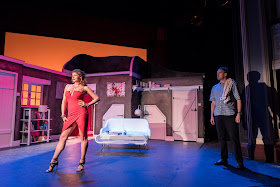"Good Neighbors"

 If a single play could be both laugh out loud funny and cry out loud sad it would be British playwright Torben Betts’s fast-paced, high-energy, and consistently attention-grabbing Invincible, a London hit now part of the Brits Off Broadway Festival at 59E59 Theaters, with various companies touring abroad. It’s also the rare play capable of juggling multiple subjects and themes—patriotism, heroism, PTSD, sex, adultery, marriage, art criticism, the war in Afghanistan, Marxism, politics, religion, pet ownership, class warfare, sports fanaticism, British football vs. cricket, boorishness, private vs. public education, middle-class emptiness, and drinking—among others. In fact, after someone in the play says England should be renamed for Tesco, the Costco-like British chain, you might think of Invincible itself as a thematic Tescoland.
If a single play could be both laugh out loud funny and cry out loud sad it would be British playwright Torben Betts’s fast-paced, high-energy, and consistently attention-grabbing Invincible, a London hit now part of the Brits Off Broadway Festival at 59E59 Theaters, with various companies touring abroad. It’s also the rare play capable of juggling multiple subjects and themes—patriotism, heroism, PTSD, sex, adultery, marriage, art criticism, the war in Afghanistan, Marxism, politics, religion, pet ownership, class warfare, sports fanaticism, British football vs. cricket, boorishness, private vs. public education, middle-class emptiness, and drinking—among others. In fact, after someone in the play says England should be renamed for Tesco, the Costco-like British chain, you might think of Invincible itself as a thematic Tescoland.
Oliver (Alistair Whatley) and Emily (Emily Bowker) are an unmarried, London couple who’ve moved to Northern England to find a cheaper lifestyle after Alan’s lost his boring civil servant job: as he puts it, “along come Mr Recession and Mr Cuts and Yours Truly is ushered very discreetly towards the exit.” Their journey north is indicated just before the play proper begins by the clever directorial device of a toy train seen crossing the stage over the living room set below.
 |
| Elizabeth Boag, Alastair Whatley. Photo: Manuel Harlan. |
Emily’s a super-idealistic Marxist with decidedly prickly principles toward anything remotely bourgeois or capitalistic; she even declares she’s offended by the less-rigid Alan’s suggestion they marry to please his dying mother. In her desire to reach out to the “real people” on her new block, she invites over the neighbor couple, the sexy Dawn (Elizabeth Boag), a receptionist at a dental clinic, and the loud, good-natured schlub, Alan (Graeme Brooks), a postman.
 |
| Emily Bowker, Graeme Brookes, Elizabeth Boag, Alastair Whatley. Photo: Manuel Harlan. |
Act One begins like a sitcom about a hilarious living room culture clash between the highly educated Oliver and Emily and their uneducated, boorish, provincial neighbors, separated by seemingly insuperable problems of communication. Act Two, though, gradually exposes both couples’ feelings of anxiety, loneliness, and desire for self-worth, revealing how much closer these couples are than their first encounters would suggest. 

The characters’ exaggerated behavior is occasionally uproarious. Especially notable are Dawn, a brunette hottie who arrives in a tight, red, cocktail dress, contrasting with Emily’s stylishly subdued, homemade duds, and Alan, a rabid fan of England’s national football team who glugs his beer straight from the can; his floppy belly seems to be escaping his pants, not unlike the way his buxom wife’s breasts are breaking free from her dress.
 |
| Graeme Brookes. Photo: Manuel Harlan. |
Alan, as played with relentless volume and spirited panache by the bearish Brookes, is particularly memorable, a man who can’t shut up even when he insists he’s doing so. When he sees a book about Karl Marx on the table he assumes it’s about the Marx Brothers, whose comedy he admits he doesn’t get. He then launches into a one-man Laurel and Hardy routine to demonstrate what real comedy is.
 |
| Emily Bowker, Alastair Whatley. Photo: Manuel Harlan. |
A central moment in the couples’ evolving relationship involves Alan’s fondness for painting his pet cat, Invincible a.k.a. Vince, named for the aircraft carrier he served on. Oliver says Emily can earn sizable commissions for her abstract expressionist art in the style of Jackson Pollock (the jocular Alan can’t resist mocking the name as “bollocks”) so Alan begs her to judge his amateurish renderings. The escalating comic tension before she blurts out the painful truth and Alan pitifully responds makes this one of Invincible’s sharpest scenes.
Another standout scene involves Emily and Alan, who’ve sworn off liquor since an incident when they were drunk and their child died, an event that drove Emily into her save-the-world brand of communist advocacy. When Alan convinces the reluctant Emily to down some wine, even as their current child sleeps offstage, the raucous, if clichéd, results are perfectly managed.
 |
| Graeme Brookes, Elizabeth Boag. Photo: Manuel Harlan. |
And let us not forget the fate of that much-discussed eponymous cat, with its eyes always trained on Emily’s guinea pigs, a fate ironically tied to Alan’s talents as a cricket bowler. Ultimately, the secret of Vince’s disappearance gets tangled in an adroitly contrived scene of confused intentions where the characters are talking about two different things while thinking they’re on the same page.
The excellent ensemble is well served by Max Pappenheim’s terrific sound design, Andy Purves’s efficient lighting, Victoria Spearing’s living room set and character-revealing costumes, and Stephen Darcy’s enthusiastic direction (original direction by Christopher Harper).
Torben Betts has written a play that, for all its purely English characteristics, makes perfect sense on this side of the pond. Still, it would be nice to see a play along the same lines written from an American point of view, with particular reference to this moment in our national history. Instead of Invincible, it's snarky title might be Vindicated.
OTHER VIEWPOINTS:
59E59 Theaters
59 E. 59th St., NYC
Through July 2

